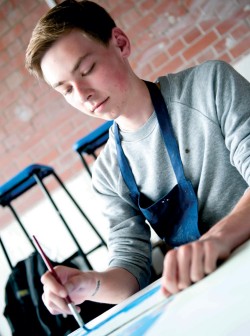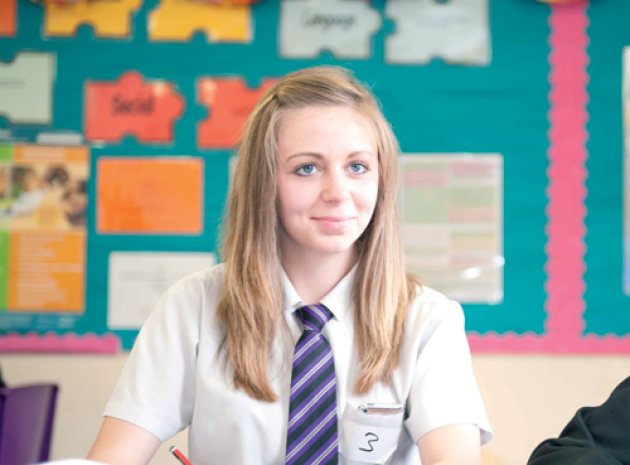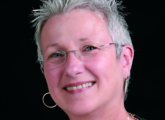School Profile
p>p>Location: Ipswich
Pupils: 900
When Nancy Robinson was offered an interview for the position of principal at the newly formed Ipswich Academy, she wasn’t really thinking about revolutionary models of education, or the implications of working as part of an international network of learning establishments. She’d never heard of ‘Kunskapsskolan’ – although when she realised that she’d have to travel to Stockholm for the selection process, she did some fairly intense research. What she did have was a significant emotional and professional investment in the Academy itself, having spent six years as a senior leader at its predecessor institution, Holywells High School, before taking up a deputy headship, and then headship, of another school in the neighbouring county of Norfolk.
“I saw the post advertised,” she recalls, “and felt an immediate tug, pulling me back. I’d given six years of my career to Holywells, and had followed its fortunes closely since leaving – including watching it go into special measures, and then come out again. I was very intrigued to know how things were, and what the change to academy status was likely to mean for the staff and pupils. That was it, really. But when I went for the interview, I was blown away by the model that was presented to me. Having always worked in challenging schools, I do believe the old adage: if you do the same things, you’ll get the same results. When a school isn’t working for its students, then it’s absolutely crucial to do something different. It amazes me, really – I’m soon to be 56 years old, and yet schools haven’t changed enormously from when I was a child. You go from lesson to lesson, and learning isn’t joined up – it’s such a shame. Our model addresses that, and starts, always, with the individual.”

The ‘model’ to which Nancy is referring is the Swedish Kunskapsskolan (it translates as ‘knowledge school’) approach to education, which is based on personalised learning, with every young person following a long-term learning and attainment plan agreed between the student, and his or her personal tutor and parents or carers. Since its establishment in 1999, Kunskapsskolan has become Sweden’s second largest secondary education provider, operating 33 schools across the country. Its innovative approach and impressive results soon caught the attention of UK education specialists, and The Learning Schools Trust (LST) was eventually established to operate Kunskapsskolansponsored academies in England; the first two of which (Hampton and Twickenham) opened in the Council of London Borough of Richmond-Upon-Thames, in September 2010. The Ipswich Academy joined the partnership in March 2011, with Nancy Robinson as principal.
“There’s no doubt that the school has underachieved for a long time,” she points out. We’re in a relatively deprived area; with 23% of students on free school meals, and 40% with SEN, I’m aware that there are more challenging demographics, of course – but in this part of Ipswich, we are surrounded by high achieving, over subscribed schools, which put pressure on the predecessor school and us, to a certain extent, in our first years as an academy. But we’re still working with the same kids, and we want to stay at the heart of the community we serve. We’re moving to a £16M new build site from September 2012 – it’s just half a mile away, and has given parents and students a much-needed boost. They simply haven’t been used to being encouraged to aspire.”
No one, least of all Nancy, is under any illusion that the Kunskapsskolan model could ever simply be transposed across from Sweden and applied instantly and in full to an English school. There was always bound to be a period of transition, and a certain amount of adjustment to ensure that the approach would work smoothly in a different national context. Nonetheless, there are certainly some exciting transformations happening at the Ipswich Academy, and things will step up a notch when the school moves to its impressive, purpose built buildings in September. At that point, the organisation of students into three, smaller colleges (two lower school and one upper) will become much more evident and intrinsic; spaces will be available for the different kinds of learning (lectures, workshops, communication sessions, seminars, lab sessions) students will be encouraged to access in the way that best enables them to achieve their personal goals; and, crucially, there will be three full years of learners who will have been following the Kunskapsskolan journey from the start of their secondary school career (as well as a brand new sixth form). They will be used to weekly, fifteen-minute, one-to-one tutorials with their personal learning mentor (“we’ve got rid of any extraneous meetings, parents’ evenings… all the things we feel we no longer need with the new model” explains Nancy when asked how on earth time will be found for this kind of individual attention, every week, for each of 900 pupils); to learning in a variety of ways and setting their own goals; to accessing all the resources they need via an internet-based ‘knowledge portal’; and to making their own way through the various areas of study by means of carefully arranged ‘steps’, climbing as fast, and as far, as they like – rather than being told they have no chance at all of reaching the highest levels.
“We like to think we’re quite sensible,” smiles Nancy (below, centre). “We’re not imposing a rigid structure here – we’ll always try something, evaluate it, get feedback from stakeholders (constant, detailed feedback is an essential element of the model), then adjust it if necessary. It’s not a freefall – it’s a rigorous process, as students are tracked really closely. It’s important that we raise the exam results, of course, but our real concern with many of our students is a lack of confidence, self-awareness and aspiration. The Kunskapsskolan approach addresses this explicitly. By this route, we will ensure children achieve more than they thought possible – and that is not a hope; it is a promise.”

Added value
Even before its conversion to a Learning Schools Academy, Holywells school prided itself on taking the individual learning styles of its students into account, placing as much importance on vocational as academic study at KS4. Mal Akhlak (left) is head of the applied curriculum at the Ipswich Academy – a triple-stranded selection of options packages with a strong vocational and practical focus, which can be chosen by students in Y9. With each of the packages, pupils are also able to take part in The Prince’s Trust’s xl programme.
“The xl programme has been running here for seven years, and I joined the school six months before the first club started,” says Mal. “It began as a way of reengaging a very small group of students – 8-10 of them, selected by the head of year at the time. They were all disengaged in learning and school life in general, for a variety of reasons including low self-confidence, poor attainment levels, and high truancy. Right from the start, the way that participation in the xl clubs positively and dramatically affected students’ attitudes, confidence and motivation was clearly evident. We’ve evolved now, and instead of ‘being chosen’, students elect themselves to do the course. You see them in Y10, drifting, not knowing what they’re going to do – but by the end of Y11, they have real aspirations and self-belief, as well as, often, an improvement in their maths and English. Over 90% of them go on to college, sixth form, or further training for employment.”
The xl programme, with its small group activities, informal classroom settings, and freedom for advisers and students to find their own way through the various modules on offer (including personal, interpersonal and team skills; active citizenship; entrepreneurship and enterprise; preparation for work; and enrichment projects) is a perfect fit for the Kunskapsskolan model, and has been firmly embraced as key to the future success of the Academy. “We’re a flagship school for xl,” Mal points out. “Everyone, from our sponsors, to the principal and staff, students and teachers, is totally on board.”
Info bar
Youth charity the Prince’s trust runs xl clubs with teachers to help young people aged 13-19 who are at risk of underachievement or exclusion from education, reengaging them by giving them the space and attention they need to learn skills and confidence; integrating them back into mainstream education, and getting them ready for the world of work through small group activities. xl works towards ofqual-accredited qualifications to recognise the achievements of the young people as they progress and develop their skills. More than 60,000 young people have been helped by the clubs since they started in 1998, with 92% going into further education, training or employment after the programme. Find out more at princestrust. org.uk/xl
UK-wide success
In 2011/12 the Prince’s trust helped 11,063 young people at risk of exclusion from school through 1,073 xl clubs operating in 505 schools and centres across the UK










